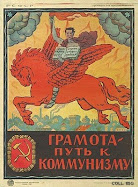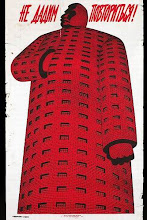
Ozymandias of U.S. Foreign Policy?
Monument to Ferdinand Marcos, commissioned by Marcos to honor his own legacy, dynamited by Communists in 2002
The Bush administration - with its cast of cold-warrior characters at the upper echelons of its military and foreign policy apparatus - carried on the worst parts of U.S. foreign policy from the previous half-century. There were countless reasons to be thankful on January 20 - the exit of these dangerous players from the world stage was high on the list.Monument to Ferdinand Marcos, commissioned by Marcos to honor his own legacy, dynamited by Communists in 2002
[I remain hopeful that the one hold-over -- Defense Secretary Gates -- is capable of learning from past mistakes and will faithfully carry out the priorities of the new President.]
When G.W. Bush drawled his now famous "you're either with us or against us" in the midst of articulating the U.S. response to the September 11 terrorist acts, he was expressing a wholly unoriginal idea. During the Cold War, the United States made a bad habit out of supporting those regimes that were anti-communist, and thus "with us," even if those governments otherwise trampled on civil rights and human dignity. Sese Seko, Pinochet, Batista, Marcos, and Suharto are just a few of the leaders supported by United States despite their anti-democratic tendencies. Committing torture, holding political prisoners, making opponents disappear, theft from government coffers on a massive scale, and other sins could be overlooked. They were all bona fide anti-communists, and that was apparently close enough to supporting American values during the cold war.
 Kissinger & Pinochet of Chile
Kissinger & Pinochet of ChileThese authoritarian leaders - and others like them - did little to deserve our support, other than agree to stay out of the orbit of the USSR. The United States - particularly after its long-overdue reformation following the civil rights movement of the 1950's and '60's - could fairly be seen as a beacon of hope and freedom for those trapped on the eastern side of the Iron Curtain. But many of the leaders and political systems the U.S. supported in those years treated internal dissenters with a hand heavier than that wielded by Soviet leaders - at least those heads of the Politburo who followed after Stalin. Many of those U.S. allies came to power following military coups and/or assassinations that deposed democratically elected governments.
Fast forward to the post-September 11 world. President Bush embraces General Pervez Musharraf in Pakistan - presumably because of his anti-terrorist and pro-American rhetoric. Nevermind that Musharraf came to power in a military coup, twice suspended the constitution, shut down private television channels, illegally jailed and fired the justices of the Supreme Court, and arrested human rights activists -- Bush continued billions of dollars to Musharraf's government. Nevermind that Pakistan would never be held to account for its role in spreading nuclear technology or for spawning the Taliban. As Stephen Colbert oft reminds us, "we're at war, pick a side!"
When Bush & Co. were beginning to run out of explanations for the Iraq fiasco in 2003 - no WMD found, no terror-links established, etc., we began to hear the refrain that the war was justified because Saddam Hussein was a tyrant who deserved to be overthrown.
"We ended the rule of one of history's worst tyrants, and in so doing, we not only freed the American people, we made our own people more secure."Of course, only the true believers in the winnowing ranks of the far right wing of the Republican party still cling to this sentiment. In more sober moments, one presumes that even they would not want U.S. troops marching off to liberate the people of the world who live under despotic regimes. Particularly not when our soldiers would - out of necessity - also be fighting those who were supplied arms and support by our own government.
—George W. Bush, Crawford, Texas, May 3, 2003
President Obama has promised multilateral engagement with friend and foe alike. Unlike his opponent in the presidential election, Obama knew that going to war in Iraq was a colossal mistake. During the campaign, he was also careful to articulate why continued support for Musharraf was at odds with our values, alienated the middle class in Pakistan, and undermined the long term interests of the United States.
While these ideas suggest a welcome wind of change, they are not an organizing principle of U.S. foreign policy. I remain hopeful that the world will get something other than blind affection for those that are "with us" and something less catastrophic than warfare for those that are "against us."
Maybe we can start with a more suitable definition of what it means to be "with us" in the first place.












